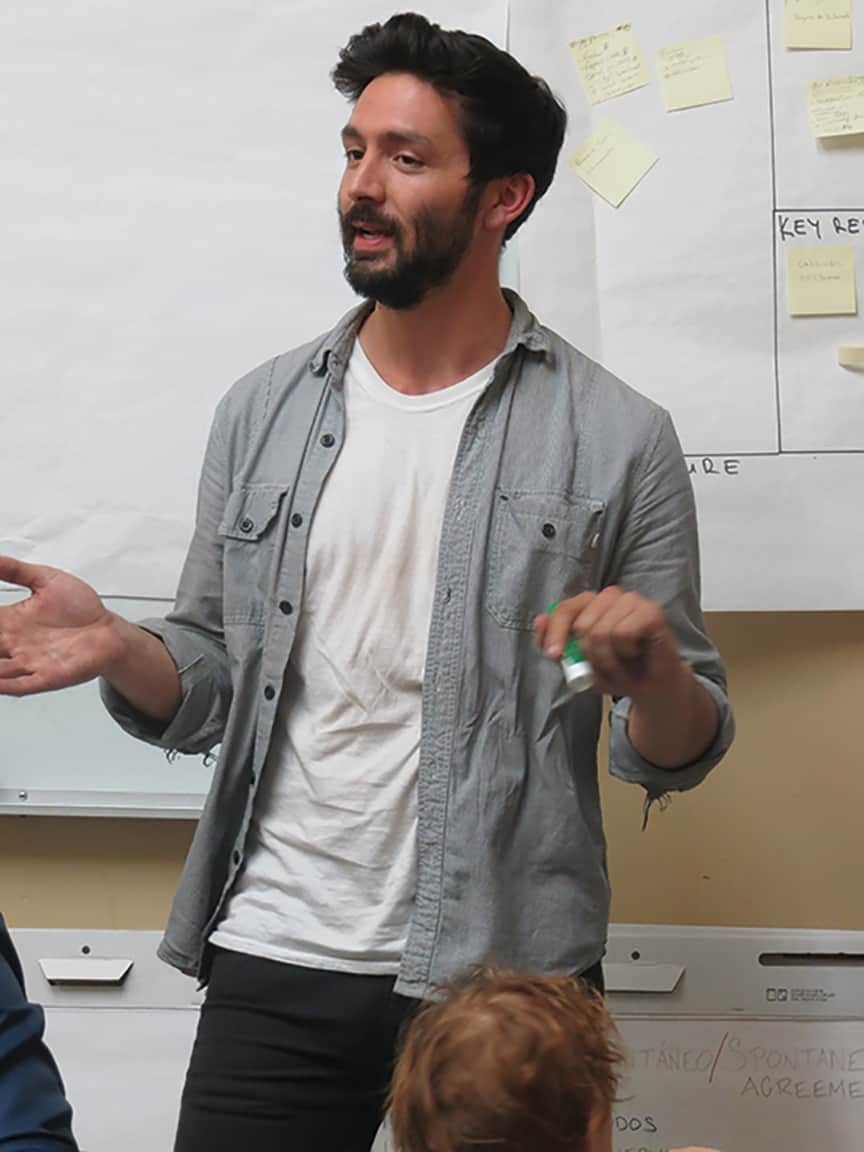Organized under the aegis of the Carroll Gardens Association (CGA), the Southwest Brooklyn Tenant Union held its inaugural meeting last month. The union is an outgrowth of the work of Ben Fuller-Googins, CGA Programming and Planning Director, and Manon Vergario, CGA Community Organizer.

The duo had worked to organize tenants of 63 Tiffany Place, a failed luxury condo rehab that was turned into rent-stabilized units in 1995. Last year there were a number of tenant complaints, including rent overcharges, and they came to the CGA for help.
After some success with the Tiffany Place residents, Fuller-Googins and Vergario realized a need for some sort of local organization to address similar issues that other residents in the area were facing in the midst of an ongoing gentrification.
Fuller-Googins and Vergario’s next step was to organize a “Know Your Rights” workshop, held at the Miccio Center on May 4. Flyers promised that participants would “learn about rent regulation laws and other housing code laws that protect tenants.” The flyer also said, “We will talk about our rights to quality repairs, and how to fight landlord harassment. Also, learn more about how you can get involved in the fight to grow COMMUNITY POWER to prevent displacement.”

The workshop was well attended. At that meeting, someone suggested creating a permanent entity to address tenant rights, Vergario and Ben created a new flyer introducing a tenant union and armed with a list of rent-regulated buildings, starting knocking on doors throughout Red Hook promoting the union and the date of the next meeting.
The June 22 meeting, held in the CGA office at 201 Columbia Street attracted an array of tenants with a variety of problems. CGA founder Buddy Scotto and representatives from the offices of Council members Brad Lander and Antonio Reynoso also attended.
Scotto founded CGA in 1978 as a community development organization dedicated to affordable housing. They organization manages 150 low income apartments in Red Hook.
The meeting’s first order of business was to go around the table for introductions. This ended up becoming much of the meeting as participants told of the reasons that brought them to the table while others offered advice.
Some felt things had gone too far. Some had moved to the neighborhood years ago when things were really bad, others had lived here their whole lives. Now, many were fearing displacement as market rents have soared.
“I hope it’s not too late,” said one woman.
“We don’t think it’s too late by any means,” answered Ben, who facilitated the meeting. “We are here to share our experiences and work together to fix things.”
Grievances ranged from rent overcharges, lack of services, and unhealthy living conditions. One woman from Dikeman Street told about her eight unit building. All had lived there for quite some time. The landlord was absent, the rents low, and repairs were made by the occupants. Recently, the building went into foreclosure and was bought by investors. None of the tenants had leases, and all are facing eviction.
One gentleman had lived in his Columbia Waterfront District apartment for 36 years. His complaint concerned renovations made to a recently vacant apartment next to his. He claimed that debris was left in the hallways, and worst of all, an ill-fitting front door allowed rats inside.
Sabrina Willis, a tenant at the Red Hook Houses who works for Councilman Reynoso, addressed many of these issues. In Williamsburg, where she works, she called landlord tactics “atrocious.”
“We see everything, including even forged leases.”
Many tenants who enjoy good relationships with their landlords don’t bother with leases, leaving themselves vulnerable when situations change. Buildings are sold to corporation who are quick to evict anyone without a lease.
Some incoming tenants are not told that their apartments are subject to rent stabilization, and end up pay full market rents.
She said that many tenants are not aware of rights they have under the law, and become intimidated when they become the recipient of landlord bullying tactics.
Another complaint that someone had involved the distribution of heat. When she originally moved in, the building had one boiler that serviced all the units. Heating costs were shared by tenants in the monthly rent. The landlord decided to remove the boiler and install electric baseboard heating, with heating costs reflected in the individual electric bills. This woman ended up paying thousands of dollars for heat during the winter months, and took her landlord to court, a long elongated process during which she has to pay the electric bill each month.
Information was shared, including the easy online availability of a free tenant handbook. It is the NY State Tenant Rights Guide, published by NYS Attorney General Eric Schneiderman.
A six minute documentary about gentrification in Crown Heights titled “Take 5,” was shown. It told the story of that community’s gentrification and how residents are fighting back. One tool used was the Crown Heights Tenant Union.
For now, the South Brooklyn Tenant Union will be meeting monthly, on the fourth Wednesday of each month. The next meeting is scheduled for 6:30, July 27 at the Miccio Center, 110 W 9th Street. In the meantime, anyone interested in becoming part of the union can contact Ben Fuller-Googins or Manon Vergiere at the Carroll Gardens Association, 201 Columbia Street, (718) 243-9301. More information is available on the CGA website.








